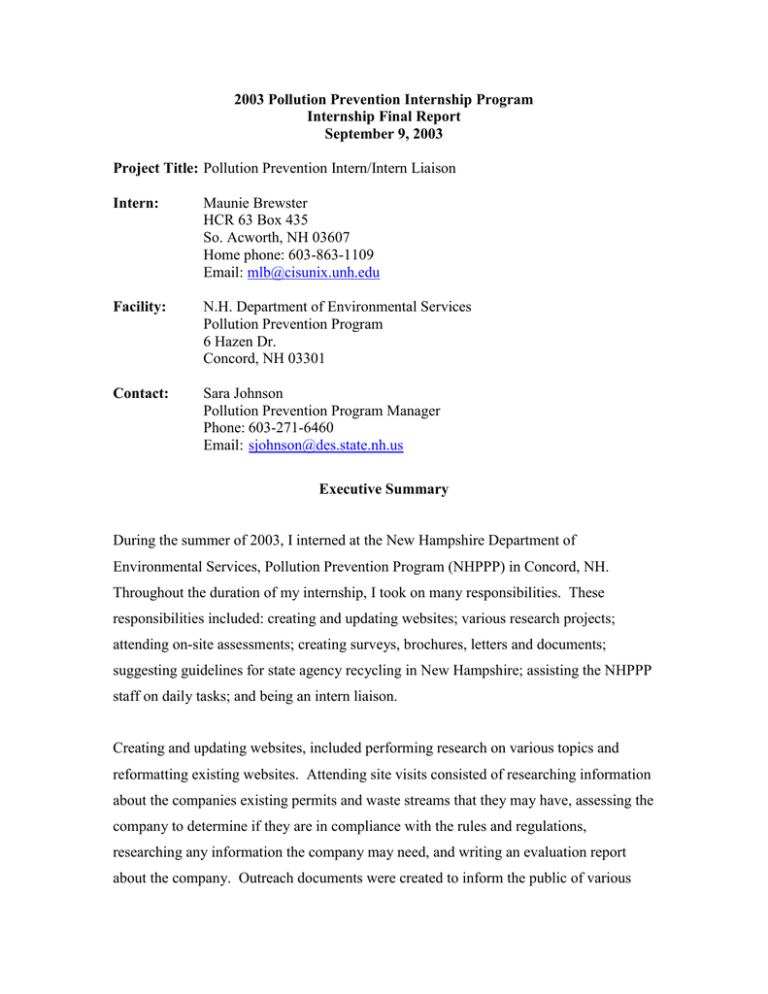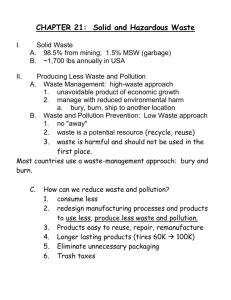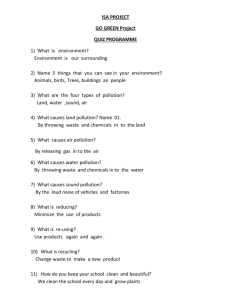2003 Pollution Prevention Internship Program Internship Final Report September 9, 2003 Project Title:
advertisement

2003 Pollution Prevention Internship Program Internship Final Report September 9, 2003 Project Title: Pollution Prevention Intern/Intern Liaison Intern: Maunie Brewster HCR 63 Box 435 So. Acworth, NH 03607 Home phone: 603-863-1109 Email: mlb@cisunix.unh.edu Facility: N.H. Department of Environmental Services Pollution Prevention Program 6 Hazen Dr. Concord, NH 03301 Contact: Sara Johnson Pollution Prevention Program Manager Phone: 603-271-6460 Email: sjohnson@des.state.nh.us Executive Summary During the summer of 2003, I interned at the New Hampshire Department of Environmental Services, Pollution Prevention Program (NHPPP) in Concord, NH. Throughout the duration of my internship, I took on many responsibilities. These responsibilities included: creating and updating websites; various research projects; attending on-site assessments; creating surveys, brochures, letters and documents; suggesting guidelines for state agency recycling in New Hampshire; assisting the NHPPP staff on daily tasks; and being an intern liaison. Creating and updating websites, included performing research on various topics and reformatting existing websites. Attending site visits consisted of researching information about the companies existing permits and waste streams that they may have, assessing the company to determine if they are in compliance with the rules and regulations, researching any information the company may need, and writing an evaluation report about the company. Outreach documents were created to inform the public of various pollution prevention strategies and regulations. These documents included: a recycling brochure that is to be given to state agency employees about state agency recycling; a NH Assistance brochure that provides contact information for free, confidential, nonregulatory assistance offered by experts in the specific field; emails, surveys and letters sent to home and health care associations, mental health clinics and nursing homes for mercury reduction strategies. Introduction/Background NHPPP provides non-regulatory, free and confidential assistance to New Hampshire businesses, municipalities, public agencies, organizations and residents. NHPPP features technical assistance, site assessments, workshops and training, and governor’s award program. NHPPP’s technical staff can research information relating to: process modifications that follow the pollution prevention (P2) hierarchy to eliminate, reduce and recycle; solid and hazardous waste management; regulatory questions; air and wastewater issues, and; energy and water conservation. NHPPP can provide you with information on new technologies, pollution prevention products and vendors, fact sheets, case studies, and success stories right from their library. The main focus for NHPPP is to eliminate pollution or wastes at the source and to minimize their release into the environment prior to recycling, treatment or disposal. Goals/Objectives My goals at the DES over the ten-week period, included: creating and updating websites; various research projects; attending on-site assessments; creating surveys, brochures, letters and documents; suggesting guidelines for state agency recycling in New Hampshire; assisting the NHPPP staff on daily tasks; and being an intern liaison. Some personal goals, included: learning more about state agencies, NH rules and regulations, and pollution prevention techniques and strategies. Approach and Accomplishments Creating and Updating Websites: Approach: A good portion of my internship was spent updating and reorganizing the NHPPP website. I reformatted many websites so that it will be easier for the public to utilize. I drafted the websites using word, and once the websites were designed in the way that the NHPPP staff agreed upon, the documents were sent to the web master at the DES who put the website together. Accomplishments: My accomplishments included: reorganizing the Universal Waste website; reformatting the Pollution Prevention at Health Care Facilities website, the Mercury Thermometer websites, the Dioxin Reduction at Healthcare Facilities website and the Mercury Reduction at Healthcare Facilities website; creating the Mercury-Free Thermometer website and the Infectious Waste websites. Research Projects: Approach: There were several research projects that were assigned to me throughout the duration of the internship. These projects included: non-toxic nail care products; pollution prevention techniques for woodworking; chemicals that remove chrome, and; storm drain run off rules and laws. These projects were done via the Internet. My first attempt at researching this information was through the Department of Environmental Services web site, if I couldn’t find adequate information there I would then search the Environmental Protection Agency’s (EPA) website, and then I would use the Google search engine on the internet. On-Site Assessments Approach: Throughout my internship at the DES, I attended several site visits. Before I could attend these visits, research had to be done on the facilities. The research included finding out if the facility had any permits, underground storage tanks and any waste streams. Once this was done, then the next step would be to attend the facility. This included taking a tour of the facility and asking appropriate questions to determine if they are in compliance with the existing rules and regulations. After the tour of the facility, my next task was to write a report that included all the information discussed at the visit, including any pollution prevention techniques that the company can benefit from. Along with the repot, I would also include fact sheets to help the company learn more about specific topics, such as: Waste Antifreeze: Management Requirements for Handlers and Transporters, Contaminated Cloth Wipes for Laundering, Mercury Containing Devices and many others. Accomplishments: I used the One-Stop website, found on the DES website, to research the facilities. This website gave me all of the information that was needed. During the visit, I would take appropriate notes so that I would be able to write the report. I visited a department of public works, two wastewater treatment plants, an automobile restoration facility and a Jr./Sr. high school. Creating Documents Surveys: Approach: NHPPP has extended their outreach to include not only hospitals but to also include home health care facilities, nursing homes and mental health clinics. The outreach will assist these facilities in the management of mercury-containing devices by promoting pollution prevention techniques. The outreach included sending out anonymous surveys to various facilities to determine their management of mercury-containing devices. The first task that I had to do was to research what devices these facilities uses. After doing this research, I’ve concluded that these facilities use: mercury thermometers, mercury thermostats, blood pressure cuffs, batteries and fluorescent bulbs. The next step was to create questions for the survey in a way that people could easily understand. Accomplishments: I created surveys to be sent out to home health care associations, nursing homes and mental health clinics. The information provided from the surveys will allow NHPPP to determine the areas they need to focus on for further outreach opportunities. Brochures: Approach: I created a state agency paper-recycling brochure that will be given to new state employees. This brochure includes why recycling is important, what are acceptable and non-acceptable recycling items, and general information on recycling paper. I found all of the necessary information via an Internet search. Accomplishments: I have created a State Office and Agency Recycling (SOAR) brochure that will be given to new state employees. This brochure will inform the employees of the importance of recycling and what items are accepted for recycling. Letters: Accomplishments: I created several letters, including: A follow-up letter to hazardous waste coordinators who attended the hazardous waste coordinator training. This letter briefly mentions the pollution prevention (P2) topics that were discussed at the training, including the benefits of P2 and the services NHPPP offers. Letters and emails about dioxin and mercury to be sent to home health care facilities, nursing homes and mental health clinics. Documents: Approach: N.H. has passed a law, stating that all state agencies must recycle paper. The problem with this law is that there are no rules or guidelines for state agencies to follow. One of my tasks this summer was to suggest guidelines for paper recycling at state agencies. I did this task by researching other state agency paper recycling guidelines and to determine which rules would best suit N.H. The states that I researched include: California, Nevada, Virginia, Florida, Vermont, Kentucky and Wisconsin. Accomplishments: After researching other state agency recycling rules, I put together a set of guidelines that N.H. could use to enforce state agency recycling. Intern Liaison: Approach: As an intern liaison I was responsible for answering any questions that other P2 interns had. I was also responsible for organizing the two P2 presentations. Because I worked at the DES, it was very easy for me to respond quickly to questions that interns had. I was able to use the resources that are readily available at the DES along with the Internet and/or documents. Some questions that I had included: How to begin a recycling program at Velcro? Who can I call to recycle shrink-wrap, fiber drums and other plastics? Where can I find a format for creating a RCRA plan? Where can I find a website for nationally banned pesticides? Where can I find a list of vapor recover “State 2” equipment that hospitals can buy? Other tasks that I performed as an intern liaison included: creating an agenda for the P2 presentations and forwarding the emails to the interns that the P2 coordinator would direct to me. Chemical usage, equipment needs: None Release/waste generated at the facility None Pollution Prevention Benefits Promoting pollution prevention, reducing waste, properly managing mercury-containing products and dealing with compliance issues are all pollution prevention benefits that NHPPP offers. Promoting pollution prevention has several benefits, including: saving money, using raw materials, staff resources, equipments, energy and water more efficiently; improving worker health and safety, decreasing regulatory requirements, and; improving community relations, company image and customer loyalty. The benefits of pollution prevention will protect the environment by reducing the risk of toxic releases into the atmosphere. References: New Hampshire Pollution Prevention Program, August 13, 2003, http://www.des.state.nh.us/nhppp/. U.S. Environmental Protection Agency, August 2003, http://www.epa.gov. “Recycling Household Paint,” New Hampshire Department of Environmental Services, 2003. www.des.state.nh.us/factsheets/sw/sw-25.htm. “Pollution Prevention Tips for Paint,” New Hampshire Department of Environmental Services, 2003. www.des.state.nh.us/factsheets/hw/hw-14.htm Waste Management Universal Waste, New Hampshire Department of Environmental Services, 2003. www.des.state.nh.us/uw.htm. Business Assistance Wood Furniture Manufacturing Compliance and Pollution Prevention Workbook, July 2003. www.pprc.org/pprc/sbap/workbook/tocwood.html Hospitals for a Healthy Environment, August 2003. www.h2e-online.org/ Health Care Without Harm, August 2003. www.noharm.org. Appendix - To get more information on “green” cleaning products Mike Sawchuk 120 Eglinton Ave East, Suite 1100 Toronto, Ontario M4P 1E2 Phone: (416) 440-4212 Fax: (416) 487-4125 Email: msawchu@attglobal.net - To find out California’s state agency recycling regulations Brian Foran Phone: (916) 341-6597 Email: bforan@ciwmb.ca.gov - To find out what chemicals are used for chrome etching George Cushnie National Metal Finishing Resource center 10507 Walter Thompson Drive Vienna, VA 22181 Phone: 703-255-2240 Fax: 703-255-2248 Email: george@caiweb.com



